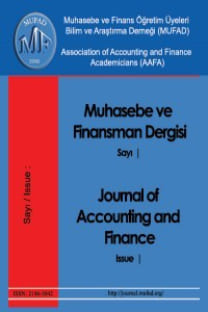Koşulsuz Muhasebe İhtiyatlılığı: Türkiye’den Kanıtlar
Muhasebe İhtiyatlılığı, Koşulsuz Muhasebe İhtiyatlılığı, Bilanço İhtiyatlılığı, Piyasa Değeri / Defter Değeri Oranı.
___
- Ahmed, Anwer.S, Billings, Bruce K. and Stanford-Harris, Marry, Morton, Richard K. (2002). “The Role of Accounting Conservatism in Mitigating Bondholder-Shareholder Conflicts over Dividend Policy and in Reducing Debt Costs”, The Accounting Review, 77(4), pp.867-890.
- Ahmed, Ahmed H. and Hussainey, Khaled (2017), “Is Egeyptian Corporate Financial Repoting Becoming More Conservative?”, Journal of Financial Reporting and Accounting, 15(3), pp.333-346.
- Basu, Sudipta. (1997). “The Conservatism Principle and The Asymmetric Timeliness Of Earnings”, Journal of Accounting and Economics, 24(1), pp.3– 37.
- Basu, Sudipta. (2005), “Discussion of Conditional and Unconditional Accounting: Concepts and Modeling” Review of Accounting Studies, 10, pp.311-321.
- Beaver, William H. and Ryan, Stephan G., (2005), “Conditional and Unconditional Conservatism, Concepts and Modeling, Review of Accounting Studies, 10, pp.269-309.
- Blair, Margeret M and Wallman, Steven.M.H. (2001), Unseeen Wealth: Report of The Brookings Task Force On Intangibles, Washington D.C., Virginia: R.R. Donelley and Sons.
- Bliss, James H. (1924). Management Through Accounts. New York, NY: The Ronald Press Co.
- Blunck, Ryan (2013), “Evidene On The Contracting Explanation of Conservatism”, Journal of Finance and Accountancy, 13.
- Brouwer, Remco. (2009). “Accounting Conservatism in Europe”, Book Chapter, published by Erasmus University Rotterdam.
- Easton, Peter and Pae, Jinhan (2004), “Accounting Conservatism and Relation Between Returns and Accounting Data”, Review of Accounting Studies, 9, pp. 495-521.
- Feltham, Gerald A. and Ohlson, James A. (1995), “Valuation and Clean Surplus Accounting for Operating and Financial Activities”, Contemprorary Accounting Research, 11(2) , pp.689,731.
- Financial Accounting Standards Board (FASB) (1980) Statement of Financial Accounting Concepts 2, Qualitative Characteristics of Accounting Information.
- Hellman, Niclas. (2008), “Accounting Conservatism Under IFRS”, Accounting in Europe, 5(2), pp.71-100.
- IASB, International Accounting Standards Board (2010), Conceptual Framework For Financial Reporting, London:IASB.
- Ruch, George W. And Taylor, Gary (2015), “Accounting Conservatism; A Review of The Literature”, Journal of Accounting Literature, 34, pp.17-38.
- Qiang, Xinrong (2007), “The Effect of Contracting, Litigation, Regulation and Tax Costs on Conditional and Unconditional Conservatism: Cross-Sectional Evidence at the Firm Level”, The Accounting Review, 82(3), pp.759-796.
- Zhang, Xiao-Jun. (2000), “Conservative Accounting and Equity Valuation”, Journal of Accounting and Economics, 29(1), pp.125-149.
- ISSN: 2146-3042
- Yayın Aralığı: Yılda 4 Sayı
- Başlangıç: 2005
- Yayıncı: Muhasebe ve Finansman Öğretim Üyeleri Derneği (MUFAD)
Yıldız ÖZERHAN, Banu SULTANOĞLU
Meta-Analiz: Finans Çalışmaları Üzerine Bir Tartışma
Değer ALPER, Muhammed Fatih AYDEMİR
Davranışsal Denetim: Finansal Tablo Hilelerin Hüristik Bir Yaklaşımla İncelenmesi
Seval SELİMOĞLU, Mehtap ALTUNEL
Marka Değeri ile Kârlılık İlişkisi Üzerine Bir İnceleme: Hirose Yöntemi ve Panel Nedensellik Analizi
Amerika ve Asya Kıtalarında Muhasebe Eğitimi
Seda ERDOĞAN, Bilgehan ÇAKMAK SEL, Mihriban COŞKUN ARSLAN
Borsa İstanbul’da İşlem Gören Turizm Şirketlerinin Nakit Akış Profillerinin İncelenmesi
Büşra TOSUNOĞLU, Selim CENGİZ, Gülşah DÖNMEZ
Yap-İşlet-Devret İle Yapılan Havalimanı Yatırımları Üzerine Bir Değerlendirme
Bülent TOPDEMİR, Murat AZALTUN
Üniversite ÖğrencilerininFinansal Davranışları ve Finansal Tutumları: Trakya Üniversitesi Örneği
